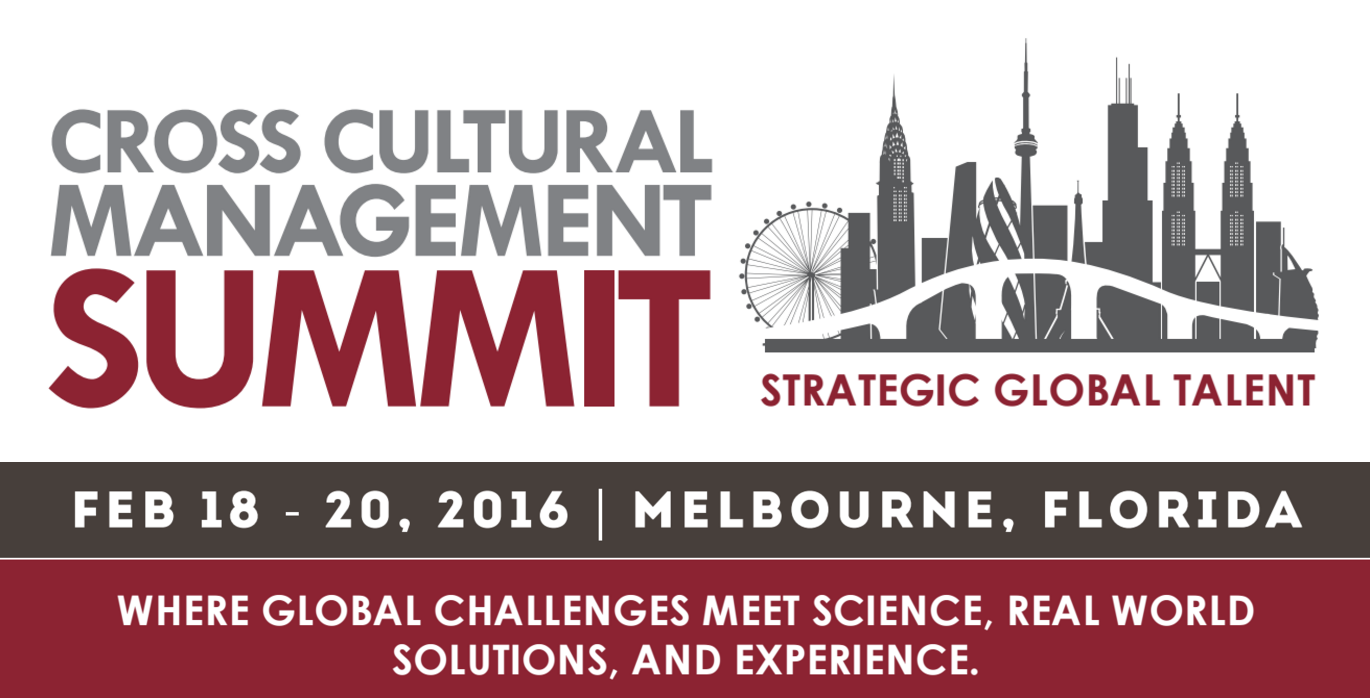Gearing Up for the 2016 Cross Cultural Management Summit
If you didn’t know it already, the Institute for Cross Cultural Management (ICCM) is hosting their second biennial Cross Cultural Management Summit in just a few short weeks. I recently had the opportunity to sit down with the Executive Director of the ICCM, Dr. Rich Griffith, to talk about this event, and here’s the scoop he gave me.
Q: This isn’t the first Summit, but I was curious where the idea came from? What started the wheels turning to host an event like this?
Dr. Griffith: Globalization has impacted just about everything we do so many professions are talking about it, but in an isolated fashion. I have been to many conferences and across different sectors and professions and you typically see that groups become pretty insulated from other stakeholders. It struck me that all parties would be better served if they got to know each other. At these conferences I have also heard people say “I wish I had their problem”. It occurred to me that the military may have approaches that could transfer to the corporate world and vice versa. The problem was that these stakeholders don’t talk to each other often and when they do they speak different languages. The Summit was designed to bring them together in a facilitated discussion that would allow different stakeholders to learn from each other.
Q: So on the ICCM website, it says the theme for this year is “strategic global talent”. What’s that about? What does it mean?
Dr. Griffith: Like all initiatives, effective international initiatives rely on preparation and having key people in the right places. But when culture becomes a variable, even more preparation is necessary. That preparation involves choosing a strategy that fits the cultural context, developing your leaders for global roles, and selecting and training a culturally competent workforce.
Q: Why should we care about cross cultural issues in management?
Dr. Griffith: If you are focused solely on a domestic market you are only paying attention to 20% of the world and very slow growth. Most economic growth is occurring in developing countries which comprise the other 80% of the world’s population. In addition much of the talent, supply chain, etc. needed for growth is coming from those regions. The real question should be “How can you NOT care about cross cultural management?”
Q: You say that you anticipate attendees coming from various backgrounds, government, academia, business and HR…..if I were one of those people, how would attending this event help me?
Dr. Griffith: The real benefit of the summit is the networks you can build. There will be a ton of learning opportunities at the event that are valuable, but building long term relationships with global professionals and experts is the real payoff.
Q: How is this year going to be different than Summit 2014?
Dr. Griffith: I am very excited for this year’s Summit. The speaker line up is phenomenal. I am looking forward to learning from a group of brilliant and experienced professionals. Our lineup of speakers includes thought leaders such as Fons Trompenaars, recognized as one of the top 50 minds in management, and brilliant academic minds such as Paula Caligiuri and Monsour Javidan who are the leading researchers in cross cultural competence and global leadership. In addition, the Summit hosts the most innovative thinkers from the corporate world such as Stan Litow, the President of the IBM foundation, and Rohini Anand, Chief Diversity officer of Sodexo.
In terms of how it is different, we have built in more interactive sessions where participants can get involved in the dialogue. In addition we added a ½ day capstone exercise with the International Red Cross. For the capstone exercise of the Summit the Red Cross has identified several organizational challenges that stem from cultural differences. Participants will use their new knowledge to work in teams to devise potential solutions to the Red Cross’s challenges. Teams will present their solutions, and then those solutions will then be turned over to the Red Cross pro bono.
Q: Where do you see the Summit going in the next few years? Can you anticipate what trends we’ll start to see?
Dr. Griffith: The next step for the Summit will be to take the show on the road. We have been exploring holding the event every year, and in alternating years hold it abroad. Our preliminary discussions have focused on Amsterdam as the first overseas Summit. In terms of trends I would like to explore the idea of how technology is being used to augment cultural solutions. In addition it would be interesting to explore why some fields, medicine for instance, have internationalized readily while others struggle with internationalization.
Q: So you’re a speaker on the schedule. What will you be talking about in your presentation?
Dr. Griffith: My talk is in the experiential learning session. The development of Cross Cultural Competence relies heavily on experiential learning. You can’t really learn this stuff from picking up a book and reading it. Experiential learning retains the nuances of cross cultural interactions, but it is messy. It is idiosyncratic in nature, often unstructured, and is not easy to evaluate. I am going to talk about a new artificially intelligent platform we are developing called Guided Mindfulness. It is super cool! The technology guides learners through mindful sensemaking during a novel cultural learning events and should improve learning outcomes.
Q: What’s your favorite part about the Summit? What are you looking forward to this year?
Dr. Griffith: I enjoy learning from smart people, and the Summit will definitely have many big brains in the room. I also enjoy the energy that comes from having fun in a stimulating environment. It will be great to see my old friends, and make some new ones.
The Cross Cultural Management Summit will be hosted at the Crowne Plaza in Melbourne, Florida from February 18th to 20th. Check out the website to register and learn more!





